

10-Minute Background. Well, I was browsing the Wizards boards, and I found this thread by The Stray.
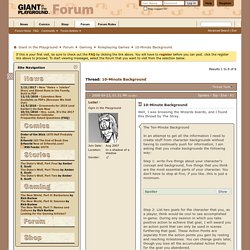
The Ten-Minute BackgroundIn an attempt to get all the information I need to create stuff from character backgrounds without having to continually push for information, I am asking that you create backgrounds the following way:Step 1: write five things about your character’s concept and background, five things that you think are the most essential parts of your character. You don’t have to stop at five, if you like…this is just a minimum.SpoilerShowExample: Martin Tenbones 1) He is a former pirate and retired adventurer and now owns a tavern in the city of St.
Clarice. 2) He is outgoing and charismatic, and attempts to keep abreast of all the local gossip and juicy secrets that pass his way, because he believes that knowledge is power. 3) He and his former adventuring band fought against the forces of the pirate captain Craven, who was a major lieutenant for the current Dread Pirate Hellbeard. Why Dungeons & Dragons is Good for You (In Real Life) The Role of the Game Master. First off, let me say that I tend to use the term “Game Master,” or GM, when referring to the person sitting behind the screen.

There are other names, and they include Dungeon Master, Loremaster, Storyteller, Referee (my least favorite), The Computer, Spymaster, and so on. One of the most important people at the table is the Game Master (GM). This is not to say the game runs at the whim of the GM or that the game “belongs to” to the GM. In a typical role playing session, if the GM is absent, then the players tend to resort to playing card games, board games, or just go home to relax. Semper Initiativus Unum: How Not to Write an Adventure. Jason Paul McCartan at OSR Today wrote a short link to an article from a site called RPG Knights that alleges to give advice for how to design adventures.
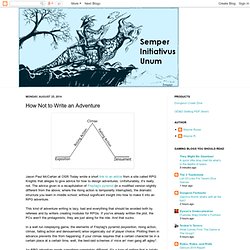
Unfortunately, it's really not. The advice given is a recapitulation of Freytag's pyramid (in a modified version slightly different from the above, where the rising action is temporarily interrupted), the dramatic structure you learn in middle school, without significant insight into how to make it into an RPG adventure.
This kind of adventure writing is lazy, bad and everything that should be avoided both by referees and by writers creating modules for RPGs. Boulders v Keyholes: RPG Obstacles - The General's Tent. Have you ever had the experience as a GM where you’ve crafted an exciting adventure and your players get stuck on the very first obstacle.
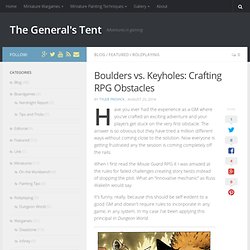
The answer is so obvious but they have tried a million different ways without coming close to the solution. Now everyone is getting frustrated any the session is coming completely off the rails. When I first read the Mouse Guard RPG it I was amazed at the rules for failed challenges creating story twists instead of stopping the plot. What an “innovative mechanic” as Russ Wakelin would say. It’s funny, really, because this should be self evident to a good GM and doesn’t require rules to incorporate in any game, in any system. Some obstacles are bigger than others. Dev Notes 9 - What is a Roleplaying Game?
Thanks to Enworld forum user Evenglare for reminding everyone of this XKCD comic.
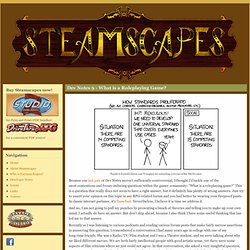
Because our last pair of Dev Notes weren't sufficiently controversial, I thought I'd tackle one of the most contentious and frenzy-inducing questions within the gamer community: "What is a roleplaying game? " This is a question that really does not seem to have a right answer, but it definitely has plenty of wrong answers. Just try to assert your opinion on this topic in any RPG-related forum and you had better be wearing your fireproof pants. In classic internet parlance, it's flamebait. Nevertheless, I believe it is time we address it. And no, I am not going to pull my punches by presenting a bunch of theories and telling you to make up your own mind. Recently as I was listening to various podcasts and reading various forum posts that make fairly narrow assertions in answering this question, I remembered a conversation I had many years ago in college with one of my long-time friends.
Let's break that down. Wayne Brady uczy improwizacji. Dave Morris: The Way of Improvisation. Gm techniques - How to Manage Player Frustration and Disengagement - Role-playing Games Stack Exchange. I like the answers posted so far.
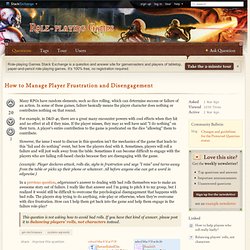
I have had a number of experiences related to dice frustration. There's been the table of mostly engaged players except for that guy that gets mad whenever he doesn't cleave an orcs head in every time he tries. We don't play with that guy anymore. Then there's the engaging mid-level campaign where everyone is starting to get frustrated because they've invested time from level 0 in the campaign and like it but the dynamics of their characters don't make sense anymore and everyone wishes they go could go back and change something critical at level 1. 11 ways to be a better roleplayer - LOOK, ROBOT. (Edit: Since I published this piece a few months ago, an awful lot of people have looked at it and several of them have complained about the swear words in it.
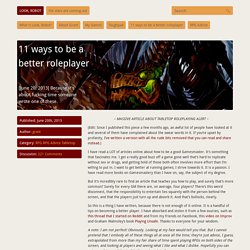
If you’re upset by profanity, I’ve written a version with all the rude bits removed that you can read and share instead.) I have read a LOT of articles online about how to be a good Gamesmaster. It’s something that fascinates me. I get a really good buzz off a game gone well that’s hard to replicate without sex or drugs, and getting hold of those both often involves more effort than I’m willing to put in.